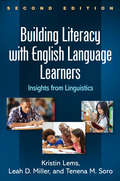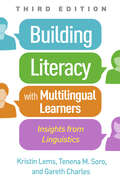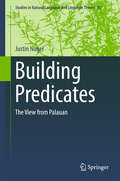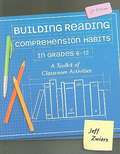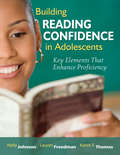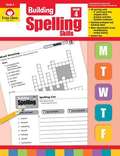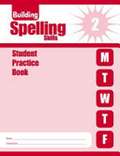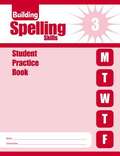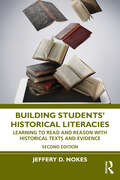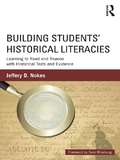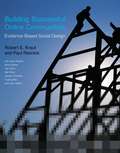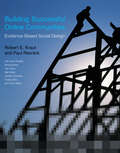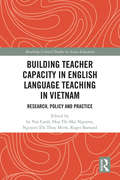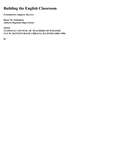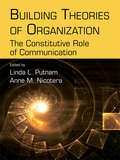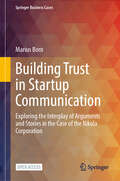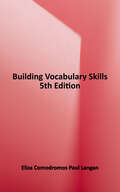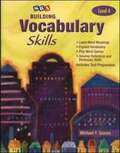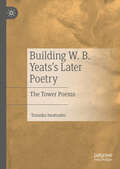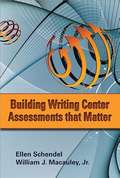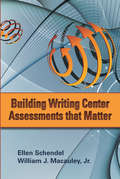- Table View
- List View
Building Literacy with English Language Learners, Second Edition: Insights from Linguistics
by Kristin Lems Leah D. Miller Tenena M. SoroHow can linguistics help teachers of English language learners (ELLs) improve their instruction? What specific competencies do ELLs need to build in order to speak, listen, read, and write in a new language? Now revised and expanded with a broader view of literacy, this book has guided thousands of inservice and preservice teachers to understand the processes involved in second-language acquisition and help ELLs succeed. The authors explain relevant linguistic concepts with a focus on what works in today's diverse PreK-12 classrooms. Effective teaching strategies are illustrated with engaging classroom vignettes; the volume also features instructive discussion questions and a glossary. (First edition title: Teaching Reading to English Language Learners.) New to This Edition *Chapter on digital learning, plus new content on digital technology throughout the book. *Broader view of literacy; increased attention to oral language and writing as well as reading. *Even more user friendly--additional classroom suggestions from real teachers, vignettes, and examples and graphics illustrating linguistic concepts. *End-of-chapter "challenge questions" that inspire deeper reflection. *Coverage of timely topics, such as numeracy and the language innovations of text messages. This e-book edition features 18 full-color figures. (Figures will appear in black and white on black-and-white e-readers).
Building Literacy with Multilingual Learners: Insights from Linguistics
by Kristin Lems Tenena M. Soro Gareth CharlesNow in a revised and expanded third edition, this established course text and teacher guide explores the processes involved in second-language acquisition and translates the research into practical instructional strategies for PreK–12. Engaging classroom vignettes and personal reflections from the authors and other seasoned educators bring the teaching methods and linguistic concepts to life. Highlighting ways to draw on emergent bilingual and multilingual students' strengths, the book presents innovative learning activities, lesson-planning ideas, technology applications, downloadable reproducible forms, and other resources. Second edition title: Building Literacy with English Language Learners. New to This Edition *Chapter on visual literacy. *Extensive updated coverage of literacy in the digital age, including gamification and video games, digital reading, and uses of ChatGPT in the classroom. *Increased attention to multimodal projects and activities. *New or expanded discussions of translanguaging, dual-language instruction, English as a lingua franca as well as an academic language, and other timely topics. Pedagogical Features *"How Does This Look in the Classroom?" sections. *Study and discussion questions in every chapter. *Chapter-opening "Key Vocabulary" boxes. *End-of-book glossary.
Building Poems
by Michael Clay ThompsonUses architecture as an extended metaphor, showing that poems are constructed like buildings and with careful attention to every detail
Building Power in Reading and Writing
by Henry I. ChristPart One reviews all the reading skills you will need either to take tests Part Two reviews common usage errors Part Three reviews writing skills Part Four is a thorough review of both reading and writing skills
Building Predicates: The View from Palauan (Studies in Natural Language and Linguistic Theory #92)
by Justin NugerThis volume provides a comprehensive analysis of the syntax of Palauan that will appeal to anyone interested in Austronesian languages or formal syntactic and morphological theory. This volume proposes that words in Palauan are not drawn directly from a mental lexicon, but are instead composed at least partially in the syntax. Using original data from syntactic constructions not previously explored in the language, the author entertains several competing theories of word formation and highlights the compatible and incompatible aspects of each, through an exploration into new corners of Palauan syntax and morphology.
Building Reading Comprehension Habits in Grades 6-12: A Toolkit of Classroom Activities (Second Edition)
by Jeff ZwiersThis second edition succinctly describes practical ideas, including more than 15 new activities, which have been working in a wide range of middle school and high school classrooms. The author has used the ideas, seen them used by others, and researched their effectiveness in a variety of settings.
Building Reading Confidence in Adolescents: Key Elements That Enhance Proficiency
by Holly A. Johnson Lauren Freedman Karen F. ThomasThe authors present a research-based approach for building reading self-efficacy and focus on four concepts necessary to learners' literacy success: confidence, independence, metacognition, and stamina.
Building Spelling Skills (Grade #4)
by Evan-MoorThe book provides students with frequent, focused skills practice. The reproducible format and additional teacher resources provide everything needed to help students master and retain basic skills.
Building Spelling Skills Grade 2 Student Book
by Evan-Moor Educational Publishers StaffIn Building Spelling Skills Daily Practice, Grade 2, students will learn 10 spelling words per week (300 total). Two sentences for dictation are provided for each list. This title includes spelling lists, practice pages, and reproducible forms.
Building Spelling Skills, Student Practice Book, Grade 3
by Evan-Moor Educational Publishers StaffIn Building Spelling Skills Daily Practice, Grade 3, students will learn 15 spelling words per week (450 total). Three sentences for dictation are provided for each list. This title includes spelling lists, practice pages, and reproducible forms.
Building Students' Historical Literacies: Learning to Read and Reason With Historical Texts and Evidence
by Jeffery D. NokesHow can teachers incorporate the richness of historical resources into classrooms in ways that are true to the discipline of history and are pedagogically sound? Now in its second edition, this book explores the notion of historical literacy, adopts a research-supported stance on literacy processes, and promotes the integration of content-area literacy instruction into history content teaching. Providing an original focus on the discipline-specific literacies of historical inquiry, the new edition presents a deeper examination of difficult histories and offers new strategies that can be applied to all genres of historical inquiry. Nokes surveys a broad range of texts, including those that historians and nonhistorians both use and produce in understanding history, and provides a wide variety of practical instructional strategies immediately available to teachers. Featuring new examples and practical resources, the new edition highlights the connection between historical literacies and the critical reading and communication skills that are necessary for informed civic engagement. Equipped with study guides, graphic organizers, and scoring guides for classroom use, this text is an essential resource for preservice and practicing teachers in literacy and social studies education.
Building Students' Historical Literacies: Learning to Read and Reason with Historical Texts and Evidence
by Jeffery NokesHow can teachers incorporate the richness of historical resources into classrooms in ways that are true to the discipline of history and are pedagogically sound? This book explores the notion of historical literacy, adopts a research-supported stance on literacy processes, and promotes the integration of content-area literacy instruction into history content teaching. It is unique in its focus on the discipline-specific literacies of historical inquiry. Addressing literacy from a historian’s rather than a a literacy specialist’s point of view, this book surveys a broad range of texts including those that historians and non-historians both use and produce in understanding history; and includes a wide variety of practical instructional strategies immediately available to teachers. History teachers who read this book will receive the practical tools they need in order to help their students reach the national standards for history teaching. With the recent inclusion of a historical literacy component of the English Language Arts Common Core Standards Initiative, this book is also highly relevant to English, language arts, and reading teachers, who are expected, under the new guidelines, to engage their students in historical reading and writing. Visit historicalliteracies.byu.edu for additional information and resources on teaching historical literacies.
Building Successful Online Communities: Evidence-Based Social Design
by John Riedl Joseph Konstan Yan Chen Moira Burke Niki Kittur Paul Resnick Robert E. Kraut Sara Kiesler Yuqing RenOnline communities are among the most popular destinations on the Internet, but not all online communities are equally successful. For every flourishing Facebook, there is a moribund Friendster -- not to mention the scores of smaller social networking sites that never attracted enough members to be viable. This book offers lessons from theory and empirical research in the social sciences that can help improve the design of online communities.The authors draw on the literature in psychology, economics, and other social sciences, as well as their own research, translating general findings into useful design claims. They explain, for example, how to encourage information contributions based on the theory of public goods, and how to build members' commitment based on theories of interpersonal bond formation. For each design claim, they offer supporting evidence from theory, experiments, or observational studies.
Building Successful Online Communities: Evidence-Based Social Design (The\mit Press Ser.)
by Paul Resnick Robert E. KrautHow insights from the social sciences, including social psychology and economics, can improve the design of online communities.Online communities are among the most popular destinations on the Internet, but not all online communities are equally successful. For every flourishing Facebook, there is a moribund Friendster—not to mention the scores of smaller social networking sites that never attracted enough members to be viable. This book offers lessons from theory and empirical research in the social sciences that can help improve the design of online communities.The authors draw on the literature in psychology, economics, and other social sciences, as well as their own research, translating general findings into useful design claims. They explain, for example, how to encourage information contributions based on the theory of public goods, and how to build members' commitment based on theories of interpersonal bond formation. For each design claim, they offer supporting evidence from theory, experiments, or observational studies.
Building Teacher Capacity in English Language Teaching in Vietnam: Research, Policy and Practice (Routledge Critical Studies in Asian Education)
by Roger Barnard Hoa Thi Mai Nguyen Le Van Canh Nguyen Thi Thuy MinhThis timely volume opens a window on issues related to English language education in Vietnam. The authors consider that teacher quality is the key factor to be considered if the national English language curriculum outcomes are to be achievable. Aiming to shed light on key issues recently observed in the Vietnamese landscape of English language education, it examines the complexity of the institutionalization of the standardized English proficiency policy, which has been in force since 2008. That policy uses the Common European Framework of References for Languages (CEFR) as the model to set the standards and levels of proficiency for teachers, learners and state employees. The book presents both the theoretical and practical aspects of the standardization movement in English language education. The contents comprise a series of extended research-based chapters written by experts of language-in-education policy and planning in and about Vietnam from a range of perspectives including teachers, English language curriculum developers, teacher educators and researchers. The rich coverage of the book includes current discussion on English language education in Vietnam ranging from policy to practice, making it highly relevant to English teachers, teacher educators, and scholars, in Vietnam and worldwide, who aspire to broaden their horizons and professionalism.
Building The English Classroom: Foundations, Support, Success
by Bruce M. PennimanAfter nearly four decades in the classroom, Bruce M. Penniman knows what works (and what doesn't!) when it comes to teaching English. Penniman draws on his own experiences--his successes, of course, but also the mistakes he's made and the misgivings he's had--to offer guidance and support for managing the myriad demands of teaching secondary English. From addressing the numerous subdisciplines within English to making individual accommodations, from dealing with being the primary locus of literacy instruction in the school to everyday organizational strategies, Penniman helps teachers find a way to impose order on what often seems like an overwhelming array of responsibilities. Focusing on all aspects of building a successful English classroom, Penniman offers unique and proven strategies on topics such as planning for the long term; designing writing programs and literature curricula; creating effective assessment systems; implementing instructional strategies for writing, literature, media/technology, and "basic skills"; examining the curriculum through the lens of multiculturalism; attending to the needs of all students--especially those who require accommodations; giving back to the profession and pursuing a professional life outside the classroom.
Building Theories of Organization: The Constitutive Role of Communication (Routledge Communication Series)
by Linda L. Putnam Anne M. NicoteraThis volume explores the concept of communication as it applies to organizational theory. Bringing together multiple voices, it focuses on communication’s role in the constitution of organization. Editors Linda L. Putnam and Anne Maydan Nicotera have assembled an all-star cast of contributors, each providing a distinctive voice and perspective. The contents of this volume compare and contrast approaches to the notion that communication constitutes organization. Chapters also examine the ways that those processes produce patterns that endure over time and that constitute the organization as a whole. This collection bridges different disciplines and serves a vital role in developing dimensions, characteristics, and relationships among concepts that address how communication constitutes organization. It will appeal to scholars and researchers working in organizational communication, organizational studies, management, sociology, social collectives, and organizational psychology and behavior.
Building Trust in Startup Communication: Exploring the Interplay of Arguments and Stories in the Case of the Nikola Corporation (Springer Business Cases)
by Marius BornThis open access book explores the intriguing narrative of Nikola Corporation's startup journey in this insightful case study, examining its rapid ascent and subsequent decline from both a narrative and argumentative perspective. Founded by Trevor Milton, Nikola initially garnered investor interest with promises of a cleaner, sustainable alternative to diesel trucks. However, the company's surge in valuation was short-lived, as accusations from a short seller triggered a trust crisis, exposing alleged deception and raising doubts about the company's technology claims. This case study particularly focuses on the nuances of startup communication, emphasizing the critical importance of effective and trustworthy strategic communication for emerging tech ventures. It provides an in-depth look at the methods and tools necessary for startups to navigate initial skepticism and data limitations without exposing themselves to potential crises. Key insights include crafting compelling startup stories while maintaining trustworthiness, meeting investor information needs in an argumentatively convincing structure, recognizing the risks of blind faith in charismatic founders, and implementing internal checks and balances to safeguard against deception. Nikola's story serves as a cautionary tale, offering valuable lessons for entrepreneurs, investors, and scholars alike. This comprehensive examination sheds light on the challenges faced by startups dependent on emerging technologies and ambitious promises, making it an indispensable addition to the reading list of entrepreneurs.
Building Vocabulary Skills (Third Edition)
by Sherrie L. Nist Carole MohrIntroduces 300 essential words and word parts that are needed for general reading comprehension in high school and college.
Building Vocabulary Skills, Fifth Edition
by Eliza Comodromos Paul LanganThis book introduces 300 essential words and word parts that are needed for general reading comprehension in high school and college.
Building Vocabulary Skills: Student Edition Level 4
by Michael F. GravesHelps students learn key vocabulary skills through: themed, four-part lessons that include practice in word meanings, reference skills, word building, and word play; weekly word lists that include content-area words; and a complete glossary and tools and reference section.
Building W. B. Yeats's Later Poetry: The Tower Poems
by Tomoko IwatsuboThis book explores Yeats’s later poetry through the metaphor of the poetic tower, where different kinds of ‘building’ – architectural, textual, political and symbolic – were closely interrelated. It chronologically examines Yeats’s tower poems, composed during a period of dramatic personal and national transformation, from 1915 to 1932. Within a year after the Easter Rising in Dublin, Yeats acquired a half-ruined Norman tower in County Galway, Ireland, which had enthralled him for the past two decades, and textually and architecturally constructed it into a focus of his life and work. Interweaving the account of the renovation of the actual building and the textual construction in the socio-historical contexts, the book reveals the evolution of Yeats’s multiplex tower as an organizing principle of his later poetry. Using the archive of correspondence and manuscript materials of relevant poems, including those which have thus far escaped close attention, the book offers close textual-genetic analyses and a diachronic view of Yeats’s tower poetry, which, with its foundations laid decades earlier, he built in the collections from The Wild Swans at Coole (1919) to The Winding Stair and Other Poems (1933). Highlighting the delicate exchange between poetry and biography as well as between the textual architecture and the actual one, identifying a turning point in the making of each tower-oriented poem and proposing some draft-dating revisions, this first book-length systematic study on the process of Yeats’s creation of the tower casts an unfamiliar light on a familiar yet underexplored landmark in modern poetry and makes his step-by-step construction work come alive.
Building Writing Center Assessments That Matter
by Ellen Schendel William J. MacauleyNo less than other divisions of the college or university, contemporary writing centers find themselves within a galaxy of competing questions and demands that relate to assessment--questions and demands that usually embed priorities from outside the purview of the writing center itself. Writing centers are used to certain kinds of assessment, both quantitative and qualitative, but are often unprepared to address larger institutional or societal issues. In Building Writing Center Assessments that Matter, Schendel and Macauley start from the kinds of assessment strengths already in place in writing centers, and they build a framework that can help writing centers satisfy local needs and put them in useful dialogue with the larger needs of their institutions, while staying rooted in writing assessment theory.The authors begin from the position that tutoring writers is already an assessment activity, and that good assessment practice (rooted in the work of Adler-Kassner, O'Neill, Moore, and Huot) already reflects the values of writing center theory and practice. They offer examples of assessments developed in local contexts, and of how assessment data built within those contexts can powerfully inform decisions and shape the futures of local writing centers. With additional contributions by Neal Lerner, Brian Huot and Nicole Caswell, and with a strong commitment to honoring on-site local needs, the volume does not advocate a one-size-fits-all answer. But, like the modeling often used in a writing consultation, examples here illustrate how important assessment principles have been applied in a range of local contexts. Ultimately, Building Writing Assessments that Matter describes a theory stance toward assessment for writing centers that honors the uniqueness of the writing center context, and examples of assessment in action that are concrete, manageable, portable, and adaptable.
Building Writing Center Assessments That Matter
by Ellen Schendel William J. MacauleyNo less than other divisions of the college or university, contemporary writing centers find themselves within a galaxy of competing questions and demands that relate to assessment—questions and demands that usually embed priorities from outside the purview of the writing center itself. Writing centers are used to certain kinds of assessment, both quantitative and qualitative, but are often unprepared to address larger institutional or societal issues. In Building Writing Center Assessments that Matter, Schendel and Macauley start from the kinds of assessment strengths already in place in writing centers, and they build a framework that can help writing centers satisfy local needs and put them in useful dialogue with the larger needs of their institutions, while staying rooted in writing assessment theory. The authors begin from the position that tutoring writers is already an assessment activity, and that good assessment practice (rooted in the work of Adler-Kassner, O'Neill, Moore, and Huot) already reflects the values of writing center theory and practice. They offer examples of assessments developed in local contexts, and of how assessment data built within those contexts can powerfully inform decisions and shape the futures of local writing centers. With additional contributions by Neal Lerner, Brian Huot and Nicole Caswell, and with a strong commitment to honoring on-site local needs, the volume does not advocate a one-size-fits-all answer. But, like the modeling often used in a writing consultation, examples here illustrate how important assessment principles have been applied in a range of local contexts. Ultimately, Building Writing Assessments that Matter describes a theory stance toward assessment for writing centers that honors the uniqueness of the writing center context, and examples of assessment in action that are concrete, manageable, portable, and adaptable.
